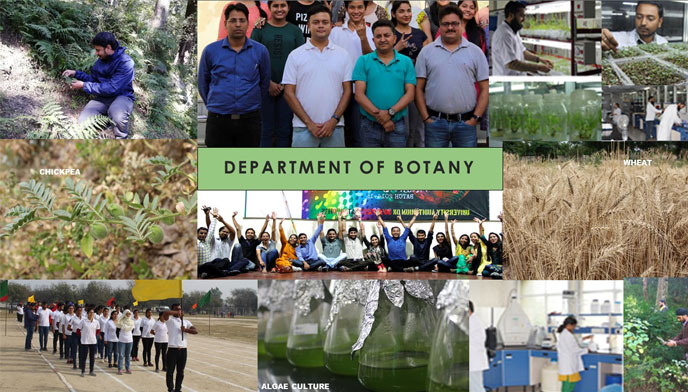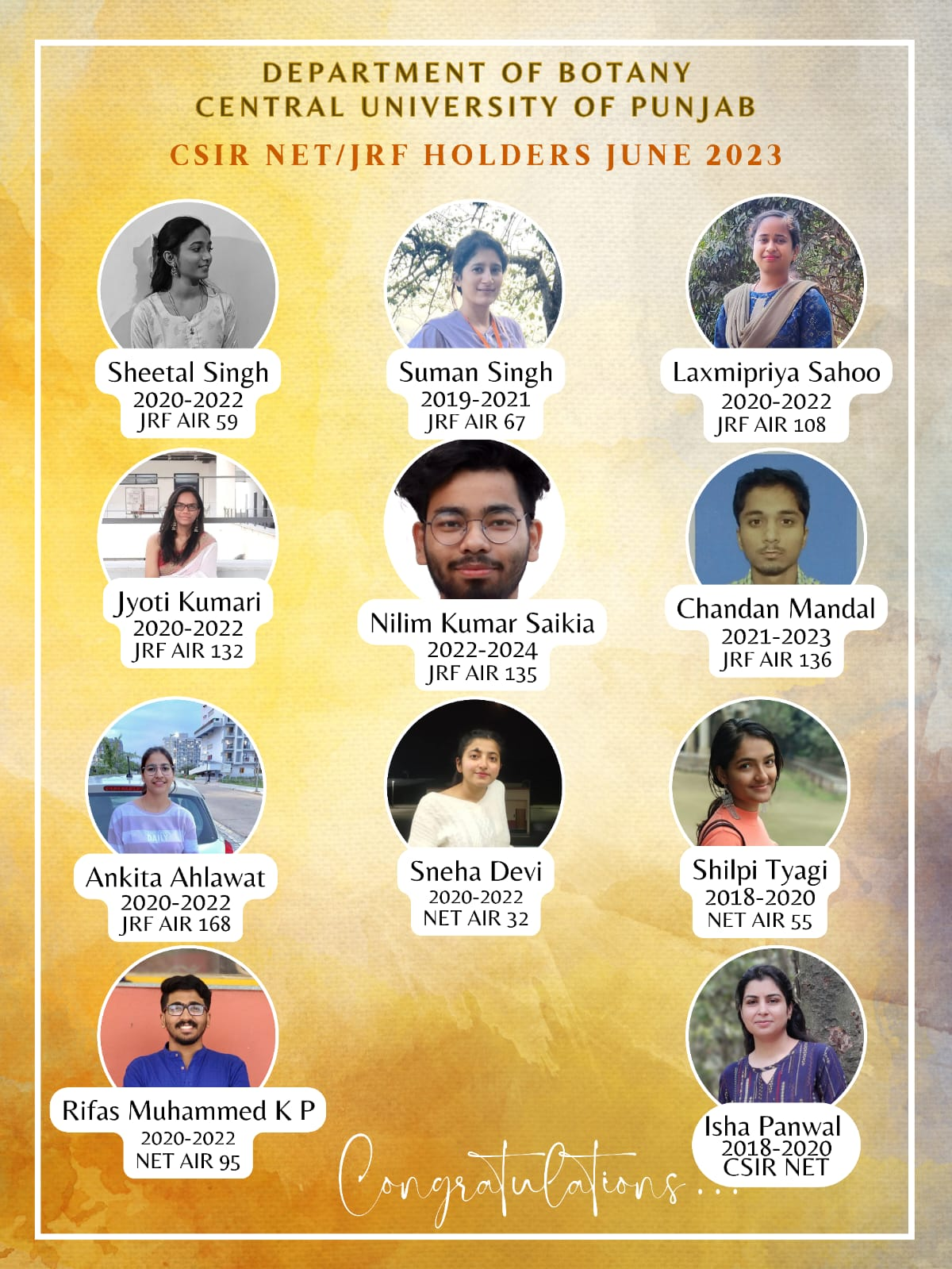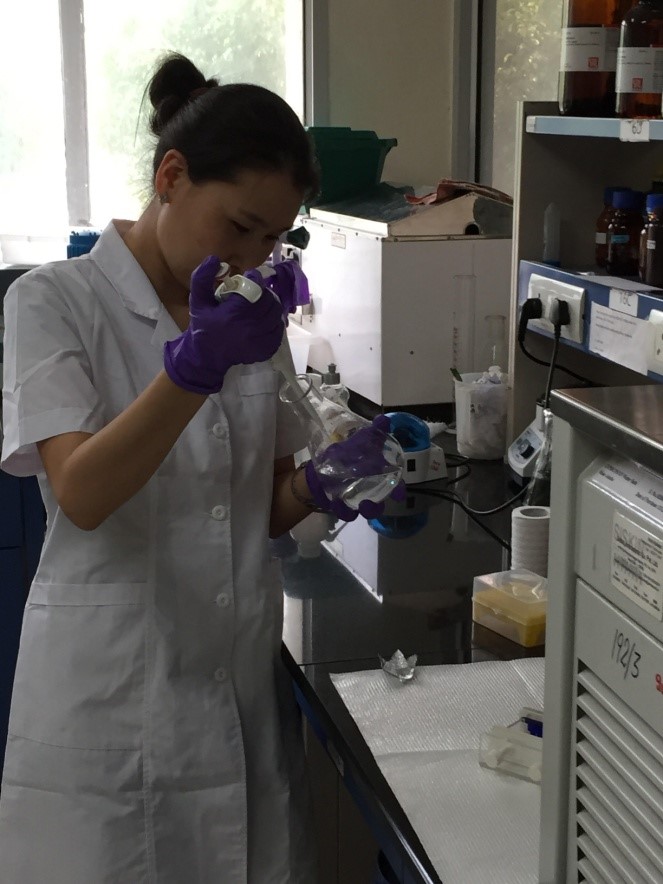
The DST-FIST supported Department of Botany started to function as a part of the Centre for Biosciences in 2009 and became an independent Centre in 2015. In 2017 the name was changed from “Centre for Plant Sciences” to “Department of Botany”. We offer two academic programs, M.Sc. in Botany and PhD in Botany. Admissions to both these programs are through an all-India entrance test, CUCET. Our department aims to achieve excellence in research and teaching in the areas of basic and applied plant sciences. This department provides excellent research and training opportunities for postgraduate students and research scholars. The department is supported by a DST-FIST Grant sanctioned in 2021. Department also houses an international herbarium which has been recognized by Steere Herbarium, NY, US as an enlisted herbarium with index herbariorum with the code “CUPB”.
Currently, research in the department is focused on Molecular Systematics, Plant Cell and Tissue Culture, Genome editing, Molecular Stress Physiology, Floristic Diversity of Antarctica, Anticancer compounds from algae and fungi, Genetics and Applied Genomics, Himalayan Lichen Photobionts, Marine, Terrestrial and Freshwater Algal diversity, and Plant Metabolic Engineering. In a short span of its existence, the department has obtained grants of over 2.4 crores from external funding agencies. The department has well equipped laboratories. Some highlights of research infrastructure include fluorescence microscopes, phase contrast microscope, RT PCR, gradient PCRs, Nanodrop spectrophotometer, Refrigerated ultracentrifuge, Laminar Flows, Cell culture facilities, plant growth chamber, and culture room. In addition, department has growth rooms for designing a wide range of experiments and offers an excellent research environment in both fundamental and applied aspects of plant molecular sciences. The department also maintains university’s central botanical garden and allied field experimental facilities.
There are four research groups in the department whose synergistic focus is the plant complexities with respect to climate change. The research and teaching labs are supported by two technical staff members. At present 19 Ph.D. scholars are doing research in the department.
Vision :
The department envisions to create responsible skill force trained in botany for the country through education and research
Missions:
- Value-based botanical education centered on ethics and character building
- Discovery Learning through first-hand exposure to excellent primary research in botany
- Skill-based training for youth empowerment and employability in botany and allied field
Faculty
- Prof. Sanjeev K. Thakur, Professor
Profile Publications - Prof. Felix Bast, Professor
Profile Publications - Dr. Vinay Kumar, Associate Professor & HOD
Profile Publications - Dr. Pankaj Bhardwaj, Associate Professor
Profile Publications - Dr. Nirmal Renuka, Assistant Professor
Profile Publications - Dr. Prashant Swapnil, Assistant Professor
Profile Publications - Dr. Yadvinder Singh, Assistant Professor
Profile Publications
Academic Programmes
- 2023-25
- M.Sc Botany
- Ph.D Botany
- 2022-24
- M.Sc Botany
- Ph.D Botany
Research Thurst Area
- Stress biology in crops.
- Plant Taxonomy,Molecular Systematics, Biodiversity, Conservation, Ethnobotany, Plant Ecology.
- Adaptation of plant species to the extreme environment and effect of climate change.
- Plant genetic and metabolic engineering.
- Tissue Culture
- Algal Biotechnology
- Abiotic stress tolerance in cyanobacteria
Facilities
Department of Botany is equipped with state-of-the-art scientific laboratories with avant-garde research infrastructure including low temperature deep freezers, Cytogenetic Workstation, Gradient PCR machines, Automated DNA Sequencer, Plant Tissue culture, laminar air flow
The department also has access to the equipment in the Central Instrumentation Laboratory (CIL):
- Atomic Absorption Spectrometer
- Confocal Microscope
- Flow Cytometer
- Fourier Transform Infrared Spectrometer
- GC-MS
- ICP-MS
- Scanning Electron Microscope
- UHPLC
Department of Botany has been involved with Union Government’s flagship program SWAYAM since the inception. Dr. Felix Bast is the coordinator of a PG level 3 credit course, Biostatistics and Mathematical Biology. Course Link: https://onlinecourses.swayam2.ac.in/cec21_bt12/preview With over 7000 enrolments all over India, this is one of the most popular courses in SWAYAM. This course had been ranked at 7th in the world in an international ranking system in 2020. Link https://timesofindia.indiatimes.com/city/chandigarh/modules-by-2-central-varsity-teachers-in-global-top-10/articleshow/73819694.cms In addition to SWAYAM, individual faculties disseminate e-contents to the students for all courses offered at the department. Many teachers adopt ‘flip class’ mode of pedagogy as well, where in the classroom hours are utilized for extensive discussions.
Our alumni have excellent track records. Some of the notable include:
- Dr. Devendra Meena: PhD from Oxford, currently an RA at Imperial College, London
- Dr. Pushpendra Singh, Scientist in State Forensic Department, MP
- Dr. Satej Bhushan, Shashi Shekhar Anand (Taiwan Govt Fellowship, PhD in Taiwan)
- Ajay Prakash (PhD, IIT Roorkee, CSIR-JRF)
- Komal (IIT Roorkee, CSIR-JRF)
- Sauradeep Banerjee (PhD, Ashoka University, CSIR-JRF)
- Manisha (CSIR-JRF PhD candidate, CSIR NIPGR, New Delhi)
- Venus (CSIR-NEIST, Jorhat, CSIR-JRF)
- Diksha Bisht (PhD, DU South Campus, CSIR-JRF)
- Archana (ILS Bhubaneshwar, CSIR-JRF)
- Muzamil & Ashutosh (Tezpur University)
- Alokesh (Assam Agricultural University)
- Adesh Kumar (CSIR-JRF PhD candidate, CSIR NIPGR, New Delhi)
- CSIR NET/JRF Holders June 2023


Foreign Students:- Mrs. Odgerel Bumandalai, Researcher, Microbial Synthesis Laboratory,
Institute of General and Experimental Biology, Mongolian Academy of Sciences, Mongolia supported by NAM S&T Centre Research Training Fellowship for Developing Country Scientists (RTF-DCS) (2016-17) with Dr. Felix Bast as mentor.

List of the Research Projects Operational in the department
- Molecular and morphological diversity in photobiont associated with Parmelioid lichens of Indian Himalaya (2018-2021) Funded by CSIR Sponsored Research Scheme (22 lakh)
- DNA Sequence-based molecular systematics of marine macroalgae from Indian Coast (2020-2023) Funded by DST-SERB Core Research Grant (37.57 lakh)
- Dr. Pankaj Bhardwaj, Transcriptomic investigations of active gene networks in hyper-accumulator plant species in response to heavy metal toxicity. Funding agency: Council of Scientific & Industrial Research, Sanctioned amount: 20 Lacs.
- Dr. Pankaj Bhardwaj, Genetic diversity assessment of highly endangered species Taxus wallichiana and Ulmus wallichiana by DNA markers and geospatial technologies for effective conservation strategies. Funding Agency: Ministry of Environment, Forest and Climate Change, Sanctioned Amount: 35 Lacs.
- Dr. Sanjeev Kumar, Identification and characterization of stress proteins and related Heat Shock Factors; assessment of up/down-regulated stress genes in preconditioned chickpea (Cicer arietinum L.). Funding agency: Central University of Punjab, Sanctioned amount: 03 Lacs (INR).
- Dr. Vinay Kumar, “Deep Sequencing for Identification and Differential Expression Analysis of Reproductive Organ(s) Enriched transcripts after Fertilization in Chickpea” Funding agency: UGC-Start Up Research Grant, Amount 10 lakhs (INR)
List of the Projects Completed
- Dr. Pankaj Bhardwaj, Analyses of genetic variations and structure of Rhododendron, a rare and endangered tree species in Western Himalayas. Funding agency: University of Grant Commission, Sanctioned amount: 06 Lacs (INR).
- Dr. Felix Bast, Sequence-based DNA barcoding, Phylogeography and Conservation Genetics of selected Medicinal Plants from Indian Subcontinent. Funding agency: Central University of Punjab, 03 Lacs (INR).
- Dr. Felix Bast, Tracing evolutionary heritage of Indian Languages using Computational Phylogenetics. Funding agency: ICSSR, 07 Lacs (INR).
- Dr. Pankaj Bhardwaj, Analyses of genetic variations and structure of Rhododendron, a rare and endangered tree species in Western Himalayas. Funding agency: Department of Science Technology, Sanctioned amount: 17 Lacs (INR).
- Dr. Pankaj Bhardwaj, Differential gene expression in response to ultra-low temperature in Rhododendron arboreum by whole genome transcriptome. Funding agency: Central University of Punjab, Sanctioned amount: 03 Lacs.
- Dr. Felix Bast, Genotoxicity detection in drinking water from Malwa region, Punjab. Funding agency: University of Grant Commission, Sanctioned amount: 06 Lacs (INR).
- Dr. Sanjeev Kumar, Investigating the mechanism associated with temperature stress tolerance imposed by non-lethal stress conditions; Understanding metabolic relationship between cold and draught x heat stress in chickpea (Cicer arietinumL.) Funding agency: University of Grant Commission, Sanctioned amount: 06 Lacs (INR).
Seminar/Symposia
- Science Academies’- INYAS Science Leadership Workshop (India’s first Science Leadership Program), From June 22 to June 28.
- Lecture Workshop:”Tangled Bank” series organized in connection with UN World Environment Day jointly by INYAS (Indian National Young Academy of Sciences) and the Central University of Punjab, Bathinda.
- An interactive session organized by Goa Science Centre in connection with UN World Environment Day jointly with INYAS (Indian National Young Academy of Sciences) 5th June 2020 at 12:30 PM.
- Organised a webinar series entitled 'Blue Planet', in connection with World Ocean’s Day, from 7th June till 9th June. jointly with INYAS (Indian National Young Academy of Sciences).
- DAV College, Bathinda, Central University of Punjab, Bathinda and Indian National Young Academy of Science New Delhi co-organized a webinar series entitled #ZeroWaste, from 16th June till 18th June.
- Science Academies’ Refresher Course on Plant Taxonomy, Ecology and Phytpgeography (March, 2019)
- Science Academies’ Lecture Workshop in Recent Breakthroughs in Plant Sciences (2016)
- Science Academies’ Refresher Course in Environmental Biology (2016)
Alumni
- Dr. Pushpendra Singh (Supervisor: Dr. Felix Bast): Scientist at State Forest department, Madhya Pradesh
- Dr. Prateek Singh (Supervisor: Dr. Sanjeev Kumar): Assistant Professor
- Dr. Satej Bhushan (Supervisor: Dr. Felix Bast): PostDoc at NIPGR, New Delhi
- Dr. Balraj Singh Gill (Supervisor: Dr. Sanjeev Kumar) : Post graduate Teacher in Higher Education Department Government of Himachal Pradesh
- Dr. Richa Mehra (Supervisor: Dr. Felix Bast) : Scientist at UNESCO-Regional Centre for Biotechnology, Faridabad.
- Dr. Pooja Rani (Supervisor: Dr. Felix Bast): Sr. Demonstrate, Dept. of Biophysics, PGIMER, Chandigarh.
- Dr. Sapna Thakur (Supervisor: Dr. Pankaj Bhardwaj):Post Doc fellow at IHBT CSIR Palampur, H.P.
- Dr. Shruti Bhardwaj ((Supervisor: Dr. Pankaj Bhardwaj): PostDoc at Umeå University, Sweden.
Board of Studies(BOS)
Notifications of BOS
- Constitution of Board of Studies, Department of Botany dated 02.05.2025
- Constitution of Board of Studies, Department of Botany dated 23.03.23
- Constitution of Board of Studies, Department of Botany dated 18.03.21
Minutes of Meetings
- Minutes of the BOS Meeting held on 06.11.2015
- Minutes of the BOS Meeting held on 08.07.2016
- Minutes of the BOS Meeting held on 27.02.2017
- Minutes of the BOS Meeting held on 19.01.2018
- Minutes of the BOS Meeting held on 21.05.2018
- Minutes of the BOS Meeting held on 16.02.2019
- Minutes of the BOS Meeting held on 29.02.2020
- Minutes of the BOS Meeting held on 21.05.2021
Academic & Administrative Committee (AAC)
Meetings of Meetings
- Minutes of the AAC Meetings held in the year 2015
- Minutes of the AAC Meetings held in the year 2016
- Minutes of the AAC Meetings held in the year 2017
- Minutes of the AAC Meetings held in the year 2018
- Minutes of the AAC Meetings held in the year 2019
- Minutes of the AAC Meetings held in the year 2021
2020
- Minutes of the AAC meeting held on 16.01.2020
- Minutes of the AAC meeting held on 04.11.2020
- Minutes of the AAC meeting held on 02.12.2020
2022
- Minutes of the AAC meeting held on 28.01.2022
- Minutes of the AAC meeting held on 16.02.2022
- Minutes of the AAC meeting held on 09.03.2022
- Minutes of the AAC meeting held on 10.05.2022
Curriculum Development Committee(CDC)
Minutes of Meetings
THE CENTRAL HERBARIUM
ABOUT :
The Central Herbarium of the Central University of Punjab is Index herbariorum enlisted herbarium located at Ghudda Village, Bathinda, Punjab, India. The herbarium has a large collection of plant vouchers from throughout the Indian Subcontinent, with a focus on seaweeds from the Indian Coastline.
Our standard international identification code is "CUPB". Please mention this code in your manuscripts where accession numbers of our herbarium are mentioned.
The herbarium is fully digitalized. Our database with scanned images of all vouchers is accessible here
SERVICES OFFERED :
We offer the following services free of cost
-
Plant specimen voucher deposition
-
A voucher can be broadly defined as a representative sample of an expertly identified organism that is deposited and stored at a facility from which researchers may later obtain the specimen for examination and further study.
-
- Plant specimen authentication
GUIDELINES FOR PLANT VOUCHER DEPOSITION :
- Press the prominent taxonomically relevant and representative plant materials, like algal fronds, flowers, branches showing branching patterns etc. on acid-free stiff cardboard paper of at least 160-300 gsm. Size of the herbarium sheet should be (31x21 cm). Guidelines for herbarium sheet preparation/plant press is here.
IMPORTANT: Herbarium sheet pressed on normal A4 sheets will not be accepted. - Label as per the following example format (Download Word format here)
Herbarium of the Central University of Punjab,
VPO Ghudda, Bathinda, 151401, INDIA
PLANTS OF PUNJAB
Striga gesnerioides (Willd.) Vatke
det.Dhanya M.S
JASSI PAUWALI: Just S. of Bathinda city limits, ± ½ mi. E. of S.H.17, along S. side of Mansa Rd. 30.158635 N,74.961092 E; 2 populations with cotton and dahlia plants growing in proximity, Height: ± 180 cm, Red round Fruits, Purple flowers; infrequent;
coll. Anju Agarwal # 0003 17 September 2022
with Rimplejeet Kaur and Jatinder Kaur
IMPORTANT: Pressed vouchers that are unlabelled/labels deviating from the required format will not be curated, and no accession numbers will be provided. - Scan the herbarium sheet with the label and keep it yourself for record and for submitting it while applying for authentication
- Send the sample to the following address (or submit it to curator by hand):
Central Herbarium
431, Academic Block, Central University of Punjab,
Ghudda VPO Bathinda Punjab 151401 India - Make sure to enclose a cover letter with the request, your full name with address, phone number, and email address. Accession number will be sent via email to the email ID provided.
GUIDELINES FOR PLANT SPECIMEN AUTHENTICATION :
-
Note that for angiosperms we need photographs of flowers for identification and authentication. Merely submitting a leaf alone will not suffice.
-
For authentication, first submit the vouchers (herbarium sheet) for accession number following the steps mentioned above.
-
With an accession number at hand, use this form to apply for authentication. Note that these are the tasks needed to complete even before applying for authentication.
-
Using PlantNet app on your mobile phone (Android/iPhone) find out the three nearest matching species names with percentage identity (You would need to mention these in the form above). Make sure to scan only flowers for angiosperms. Scanning leaf/habit/seeds are not at all reliable.
-
Authentication based on morphology will only be preliminary. For DNA Barcode based authentication please get in touch with herbarium to inquire about costs.
-
VOUCHER EXCHANGE WITH OTHER HERBARIUMS :
As an Index Herbariorum enlisted herbarium, CUPB can exchnage its specimen with other index enlisted herbariums within and outside India. For further queries please get in touch with us.
CONTACT US:
The Central Herbarium, Central University of Punjab,
VPO-Ghudda, Bathinda,
Punjab, India- 151401
Email: herbariumcupb@gmail.com
